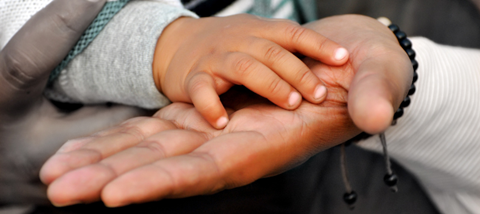
In the last couple of months our dog, Flora, has developed Lupus. For her, it means her nails split, splinter and get infected so walking can be like walking on hot coals or needles. She will even be lying down and suddenly let out a yelp. As a family, we have developed a new level of compassion and empathy for her, as we try to help her through this time.
Flora’s pain has been both visible and audible. Mental distress is often less visible yet needs us all to be willing to respond with empathy, love and care so that we create an environment where pain can be expressed. The cries might not always be audible but they are very real.
The situation with COVID over the last few months has amplified our emotions, creating difficulties with mental health. It may have exacerbated an underlying condition for some, but mental health (or mental wellbeing) is a continuum for all of us. We can find ourselves moving up and down this continuum, depending on our circumstances.
So how do we support and look out for young people and children? As the Young Minds website states: “It’s as important we value our own mental health as much as our physical health. When the bad moments have lasted a while, it may be a sign there is a problem.” If cumulatively you are seeing changes such as a growing sense of hopelessness and/or significant changes in behaviour, it may be appropriate, in the first instance, to signpost to the GP. It may also be appropriate to ask for others to help you gain perspective, particularly when so much ministry being online makes it difficult to discern how young people are doing.
At this time, I believe we are strategically placed to bring hope and life to children and young people. But to do this, we will first need to attend to ourselves and process any issues that are surfacing through this time using the tools available to us.
Here are some ideas for how to support others in their mental wellbeing…
- Focus on the positive. At present, there is enough negative stuff to drown us so we need to bring the opposite to young people we work with. We cannot control the output from media and other sources but we can choose what we think about. We need to set an example by focussing on that which is positive and life-giving. A simple way of doing this is to write 2 or 3 things that you can be thankful for in a gratitude journal at the end of each day. Young people of faith can then turn that into prayer.
- Do something that creates life and joy. It could be playing a musical instrument or sport, creating a picture or writing a story. These things sustain and give life. They help young people to feel fully alive and will vary according to the people God has made us to be. There are currently restrictions on some of these activities so we need to be creative in finding lockdown-compatible ways that they can still be pursued.
- Relate and connect. One of the real challenges at present is the lack of opportunity to do this with others. So we must make the most of building relationships right now through any means possible. I have noticed that I am much more expressive in the words I use with young people and youth leaders to make up for the fact we are not able to meet in person.
- Share what is really important. It’s a time to focus on what is foundational and important in our lives and so for us in youth and children’s work it is about focusing on what matters. It is perhaps time to go back to real foundational things of our faith to build confidence and strength in who God is and what he has done for us.
- Take one task at a time. I love the talk that an Admiral in the Navy Seal’s gave where he says that making your bed is the first achievement of the day. The idea is to start with some small achievable goal. At present, taking one day and one task at a time is a good way to live our lives and reminding the young people that each day is in God’s hands.
As children and young people are struggling through this time, we can be assured that “The Lord is close to the broken-hearted and saves those who are crushed in spirit” (NIVUK). We can be part of embodying this by showing God’s love and presence to young people. It’s a way we can make a difference at this challenging time.


































